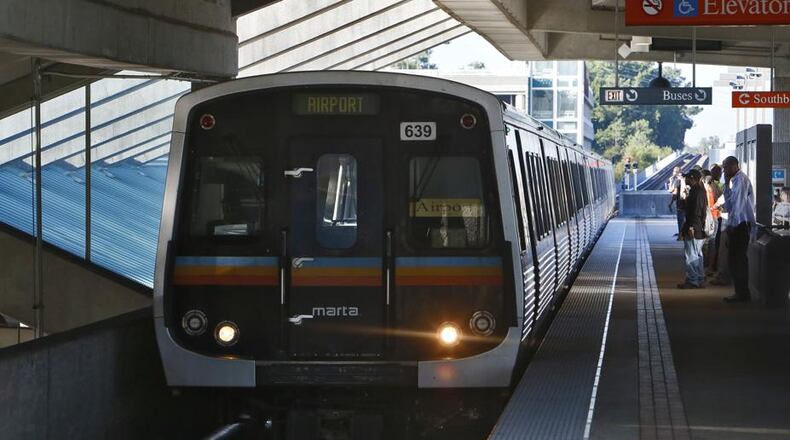A federal bailout of transit agencies amid the coronavirus pandemic will plug a big hole in MARTA's budget next year, but the agency's long-term financial picture is more precarious.
MARTA has proposed a $558 million operating budget for fiscal 2021, which begins in July. It includes no layoffs, no furloughs and — for now — no fare increase. But MARTA will use $150 million in federal pandemic relief to balance the budget.
When the federal money runs out in two years, the agency expects significant deficits brought on by the pandemic and what could be a prolonged economic recession and recovery. Nonetheless, CEO Jeffrey Parker told the MARTA Board on Thursday that the agency’s financial troubles pale compared with some other major transit services — such as New York City, which is seeking billions of dollars in federal money just to backfill this year’s budget.
“We’re not in a great position,” Parker told the board. “But we’re in a position substantially better than our peers.”
MARTA’s farebox revenue plummeted over the past two months as metro Atlanta residents sheltered in place. With much of the economy still shut down, sales tax revenue also fell.
At the same time, expenses are rising for personal protective equipment, sick leave and enhanced cleaning of vehicles and facilities. The agency will set aside $20 million in a contingency fund to pay for COVID-related expenses next year.
Earlier this week the agency said it faces a $380 million budget deficit over the next five years.
Recently approved federal aid for transit agencies will help. Georgia agencies will receive $522 million of that money, with MARTA getting $298.6 million. The agency expects to use $83 million of that money to balance this year's budget, $150 million next year and $65.6 million in 2022.
After that, projected deficits rise rapidly. That’s because MARTA officials expect the economic recovery to be slow, like the recovery from the Great Recession a decade ago.
Agency officials say they're taking numerous steps to cut expenses. Among other things, they will eliminate vacant positions, reduce overtime and consolidate management positions. More than 1,600 non-unionized workers will not receive a raise next year, though some 2,900 union workers will get a 3% raise negotiated last year.
MARTA also hopes to raise revenue. Among other things, it will study the feasibility of a fare increase. MARTA last raised fares in 2011, when the cost of a one-way trip rose from $2 to $2.50.
Parker said MARTA's capital spending will not be affected next year. It plans to spend $599 million on projects such as station improvements, track renovation and new rail cars.
It's unclear how the capital program — including expansions in Atlanta and Clayton County — will be affected in future years.
MARTA will hold public hearings on the proposed budget Monday and Tuesday. The board is expected to approve a final budget in June.
MARTA budget
MARTA will hold virtual hearings on its proposed 2021 budget:
- 11 a.m. Monday. Vist www.itsmarta.com for the virtual hearing or call 404-418-9388 and enter access code 714 167 610.
- 6:30 p.m. Tuesday: Visit www.itsmarta.com for the virtual hearing or call 408-418-9388 and enter access code 712 987 006.
Public comment will be accepted through May 22 via voice message at 404-848-5299, by email at publichearinginfo@itsmarta.com or by mail to the MARTA Office of External Affairs, 2424 Piedmont Road NE, Atlanta, 30324-3330.
About the Author
Keep Reading
The Latest
Featured




